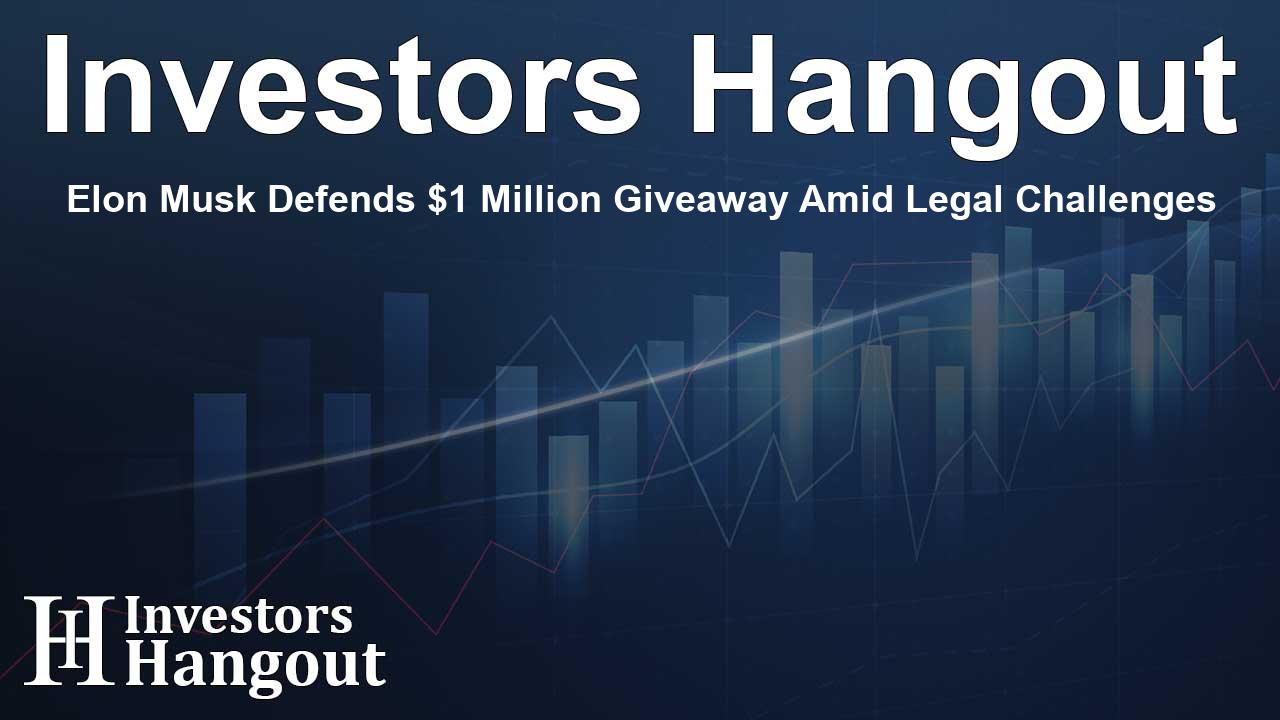Elon Musk Defends $1 Million Giveaway Amid Legal Challenges

Elon Musk's $1 Million Giveaway Under Legal Scrutiny
Elon Musk, the CEO of Tesla, is facing a proposed class action from voters who claim he misled them into signing a petition as part of his $1 million-a-day giveaway initiative. This giveaway has garnered significant attention as Musk's latest venture in engaging voters regarding support for the U.S. Constitution.
Response to Class Action and Allegations
In a recent court filing made in a federal court located in Austin, Texas, Musk sought dismissal of the case, arguing that the giveaway does not constitute an illegal lottery under Texas law. He strongly contests the notion that participants were drawn into illegal activity, asserting the conditions tied to the giveaway fall outside the definition of a prize.
Understanding the Mechanics of the Giveaway
Arizona resident Jacqueline McAferty is leading the class action, claiming that Musk and his political action committee, America PAC, induced voters from seven battleground states into signing the petition by suggesting that winners would be selected at random. Musk, however, clarifies that those who signed were informed they were being considered for a unique role as spokespeople for America PAC, thus changing the nature of the opportunity.
Legal Arguments Presented by Musk
Musk emphasizes that the giveaway's framework was not based on luck; instead, it was a structured opportunity for individuals to potentially earn $1 million by fulfilling specific criteria set by America PAC. He clearly states, "An eligible voter's opportunity to earn is not the same thing as a chance to win," distinguishing between the two concepts. This statement highlights Musk's claim that the lack of arbitrariness dismisses any claim of a lottery.
Allegations of Misuse of Personal Data
The lawsuit further alleges that signers of the petition might suffer harm due to Musk and America PAC's handling of their personal information, which included names, addresses, and phone numbers. Musk's legal team has countered these claims, insisting that no harm was inflicted on voters through this process.
Judicial Opinions and Proceedings
The proposed class action lawsuit was initiated on Election Day, raising additional legal debates regarding its legitimacy and Musk's actions. Musks's position comes on the heels of a ruling from a Philadelphia judge who opted not to terminate the contest, reinforcing that evidence presented did not conclusively establish a violation of lottery laws.
The Stake of the Lawsuit
McAferty's class action seeks reparations totaling at least $5 million for damages attributed to all petition signers. This lawsuit draws considerable attention, not solely for its implications on Musk's initiative but also for how it echoes broader concerns over the intersection of political engagement and individual's rights.
Musk's Ties to Texas
As a resident of Texas and the founder of Tesla, a major player in the automotive industry, Musk’s affiliations and local impact play a significant role in the ongoing dialogue around the giveaway. It illustrates how his business endeavors intertwine with political movements and voter engagement strategies.
Implications for Future Political Initiatives
The outcome of this legal challenge could set precedent for future use of giveaways as political tools. Musk's approach raises questions about the ethics and legality of incentivizing voter support in such a manner, prompting a reevaluation of governance surrounding political action committees and their promotional methods.
Frequently Asked Questions
What is the nature of Elon Musk's $1 million giveaway?
Musk's giveaway is a campaign initiative intended to engage voters in supporting the U.S. Constitution, promising $1 million daily under specific criteria.
What are the allegations against Elon Musk?
The allegations assert that Musk defrauded voters into signing a petition by presenting the giveaway as a lottery, thus violating Texas law.
How does Musk defend his giveaway?
He argues that participants were informed it was an opportunity to earn money, not a random lottery contest, distinguishing his action from illegal practices.
What are the potential damages sought in the lawsuit?
The class action lawsuit seeks damages of at least $5 million for those who signed the petition, claiming their rights were infringed upon.
What could be the implications of this legal case?
This case may influence how political initiatives use contests and giveaways to engage voters, potentially altering regulations of political action committees.
About The Author
Contact Addison Perry privately here. Or send an email with ATTN: Addison Perry as the subject to contact@investorshangout.com.
About Investors Hangout
Investors Hangout is a leading online stock forum for financial discussion and learning, offering a wide range of free tools and resources. It draws in traders of all levels, who exchange market knowledge, investigate trading tactics, and keep an eye on industry developments in real time. Featuring financial articles, stock message boards, quotes, charts, company profiles, and live news updates. Through cooperative learning and a wealth of informational resources, it helps users from novices creating their first portfolios to experts honing their techniques. Join Investors Hangout today: https://investorshangout.com/
The content of this article is based on factual, publicly available information and does not represent legal, financial, or investment advice. Investors Hangout does not offer financial advice, and the author is not a licensed financial advisor. Consult a qualified advisor before making any financial or investment decisions based on this article. This article should not be considered advice to purchase, sell, or hold any securities or other investments. If any of the material provided here is inaccurate, please contact us for corrections.
